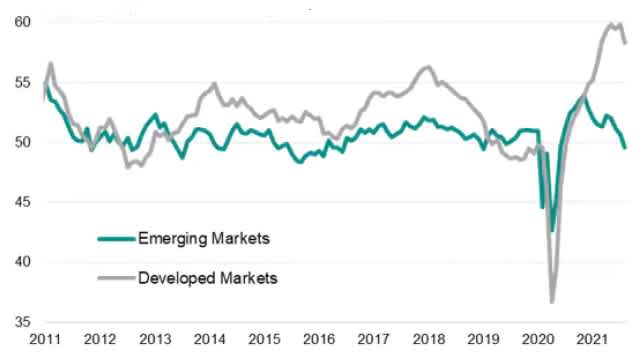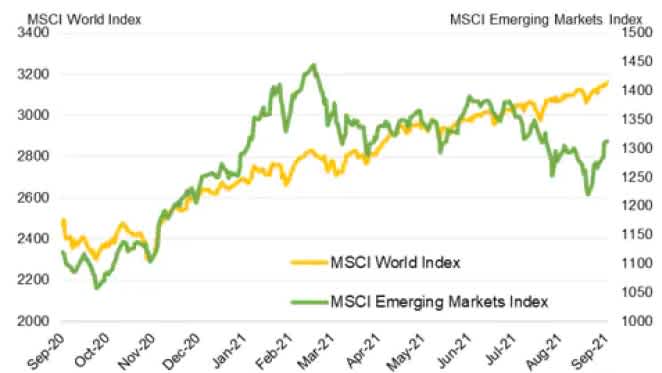Emerging countries are lagging behind!

Keytrade Bank
keytradebank.be
October 08, 2021
(updated January 24, 2022)
4 minutes to read
The trend in global manufacturing confidence is diverging. While the economic engine continues to run at high speed in Western industrialised countries, it is clearly shifting down a gear in emerging countries.
One possible cause is the coronavirus delta variant. Vaccination rates are lower in these emerging countries than in the West. As a result, we see a changing of the guard: the MSCI World is overtaking the MSCI Emerging Markets.
Various macroeconomic indicators are still signalling growth in the global economy. One of these is global manufacturing confidence. Every month, around ten thousand companies in every corner of the world receive a questionnaire. Their replies provide a picture of the direction in which their production is moving, how their turnover figures are evolving, how much they are investing and whether they are creating new jobs. All this information is pooled in the well-known "JPMorgan Global PMI" index.
This is an important barometer for investors and economists. If the index is above 50 points, then we are looking at expansion. Below the: 50-point level indicates a contraction in economic activity. Figure 1 shows the current trend in global manufacturing confidence in the industrial sector. This applies to Western industrialised markets and growth economies such as China, India, Russia and Brazil ("Emerging Markets").
You can immediately see the divergence between the two regions: there is a sharp rise in Western countries with a PMI index at its highest level since 2011, while emerging countries are experiencing a clear slowdown in growth. The latter are below the critical 50 points level!
Figure 1: Industrial manufacturing confidence trends

Source: IHS Markit, JPMorgan
One important factor in explaining this is the spread of the delta variant of the coronavirus. The industrial sector in many emerging countries does not always have sufficient labour available due to a lower vaccination rate. In addition, Figure 1 also shows a slight dip in the trend of producer confidence in the West. This does not necessarily mean a slowdown in growth. After the sharp upturn in recent months, a slight breathing space is probably welcome. However, this is reflected (temporarily) in rather fewer Western orders on Chinese manufacturing companies, for example.
These diverging economic trends have also had an impact on the stock market. Since spring 2020, the MSCI Emerging Markets Index, the benchmark index for emerging market equities, had significantly outperformed the MSCI World Index, its western counterpart. Since the summer of 2021, western stock markets have taken over the lead. This is also partly thanks to US technology giants, which have a significant weighting in the MSCI World index. The Chinese government’s crusade against local internet based companies such as Alibaba has put the MSCI Emerging Markets index on the back foot.
Figure 2: MSCI World vs MSCI Emerging Markets

Source: Refinitiv
Conclusion
The global economy is still in excellent shape. Although we cannot rule out a slight downturn in the months ahead, we do not expect a recession any time soon. However, the global economy is supported to a large extent by the Western industrialised countries. They are outperforming emerging countries, which is making itself felt in a changing of the guard on the stock market floor.
Geert Van Herck Chief Strategist KEYPRIVATE


